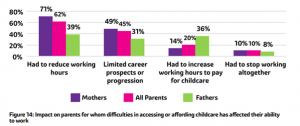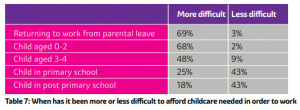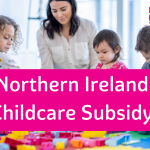Investing in childcare key to addressing Northern Ireland’s high levels of economic inactivity
Our Head of Charity Services, Aoife Hamilton, explains why investing in childcare is critical to addressing Northern Ireland’s high levels of economic inactivity.
What is economic inactivity?
The Office for National Statistics (ONS) describes people who are ‘economically inactive’ as individuals aged between 16 and 64 years old who are not in employment and have not been seeking work within the last 4 weeks and/or are unable to start work within the next 2 weeks. This can include people who are sick, students, individuals who have taken early retirement, and those who are looking after the family or home.
In a recent publication, the ONS estimates that the UK’s current economic inactivity rate is 21.3%, an increase of 1.0% percentage point on the pre-Covid-19 level. Across the various regions of the UK, the highest figure is in Northern Ireland, at 27.6%.
In Northern Ireland, figures reported the Labour Market Intelligence Portal highlight that 15% of those who are classified as economically inactive are looking after their family or home. This rises to 23% of women, and 38% of those in the 25-49 age bracket. 20% of those who are economically inactive, and who would like to work, are those who are looking after their family or home – 23% of females, compared to 5% of males.
Why does this matter?
Understanding the reasons for economic inactivity has important implications for policies in relation to issues like childcare, which clearly impacts on female participation in the workforce. Economic inactivity figures show that a significant number of people with caring responsibilities, disproportionately women, are excluded from the job market in Northern Ireland. These are individuals who would like to work, but factors such as an inability to access or afford they childcare they would need prevent them from doing so. It is important to explore why this is the case, to ensure that our local economy can benefit from their skills and experience.
In our most recent Northern Ireland Childcare Survey, we found that difficulties in accessing or affording childcare impacted on the ability of parents to work. This affected 44% of the parents who participated in the research, rising to 58% of mothers, compared to 27% of fathers.
This has impacted on those parents in a range of ways, with many having had to reduce their hours of work, others experiencing limited career prospects or progression, while some have had to stop working altogether.

Through our research we found that the time when a parent is most likely to struggle to afford the childcare they need is when they are seeking to return to work from parental leave, and for the first two years of their child’s life. This is when typically full time childcare will be required. If we are to support parents to enter into, or stay in the workforce, and help to give children the best start during their formative first 1,000 days, addressing this needs to be a priority for the Department of Education as they work on the development of a new Childcare Strategy for Northern Ireland.

At a time when one of the biggest challenges facing organisations is recruitment and labour shortages, it is critical that we address infrastructural barriers that are preventing parents from entering, and remaining in, the workforce. This includes childcare.
How can we remove barriers to parents getting into the workforce?
We need a childcare system that can promote economic participation and support families to get into and stay in work. This requires investment in an ambitious, fully funded Childcare Strategy that recognises childcare as part of our essential economic infrastructure.
An accessible, high quality, affordable childcare system is essential if we are to move towards an economy which supports everyone to thrive and enables all sectors – whether that is big business, small enterprise or the self-employed, and from retail and hospitality and tourism to IT, services and construction – to achieve their full potential.
Investment in childcare to support parents to work has wider economic benefits, not just for parents but for the economy as a whole. It was recently reported by the Centre for Progressive Policy that investment in childcare could increase the total annual income of working mothers in the UK by up to £10 billion, generating up to £28 billion in economic output per annum.
The Women’s Budget Group has estimated that investment in care – including in childcare – would produce 2.7 times as many jobs as an equivalent investment in construction, highlighting that this is an excellent way to stimulate employment. At a time when many employers, across a wide range of sectors, are struggling to recruit and retain staff, a key part of the solution is to ensure that parents are able to access and afford the childcare they need in order to work.
With work underway on a new Childcare Strategy for Northern Ireland we have a not to be missed opportunity for the Northern Ireland Executive to show their commitment to building back better, and creating a world-class childcare infrastructure – that supports parents to work, aids the wider economy and society and critically, invests in the social and educational development of our children – the benefits of which will be felt for generations to come.






